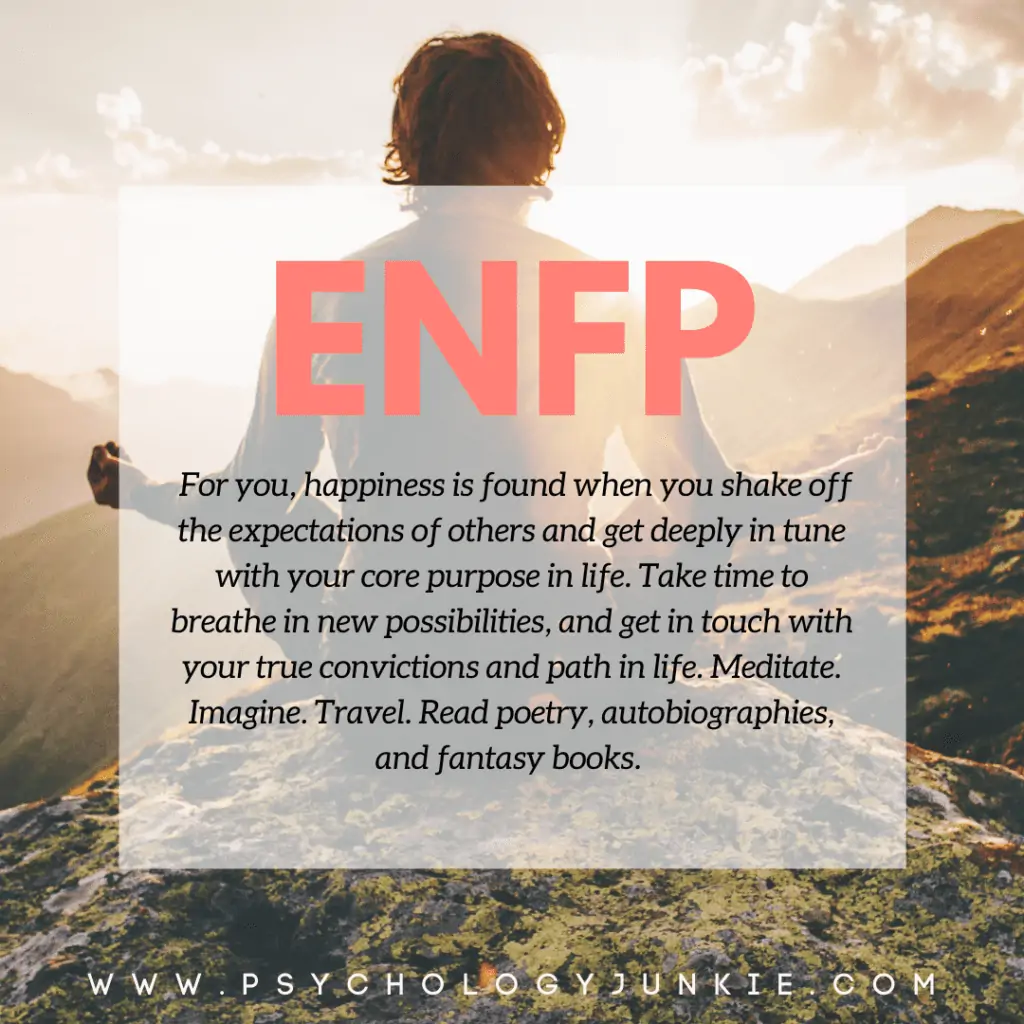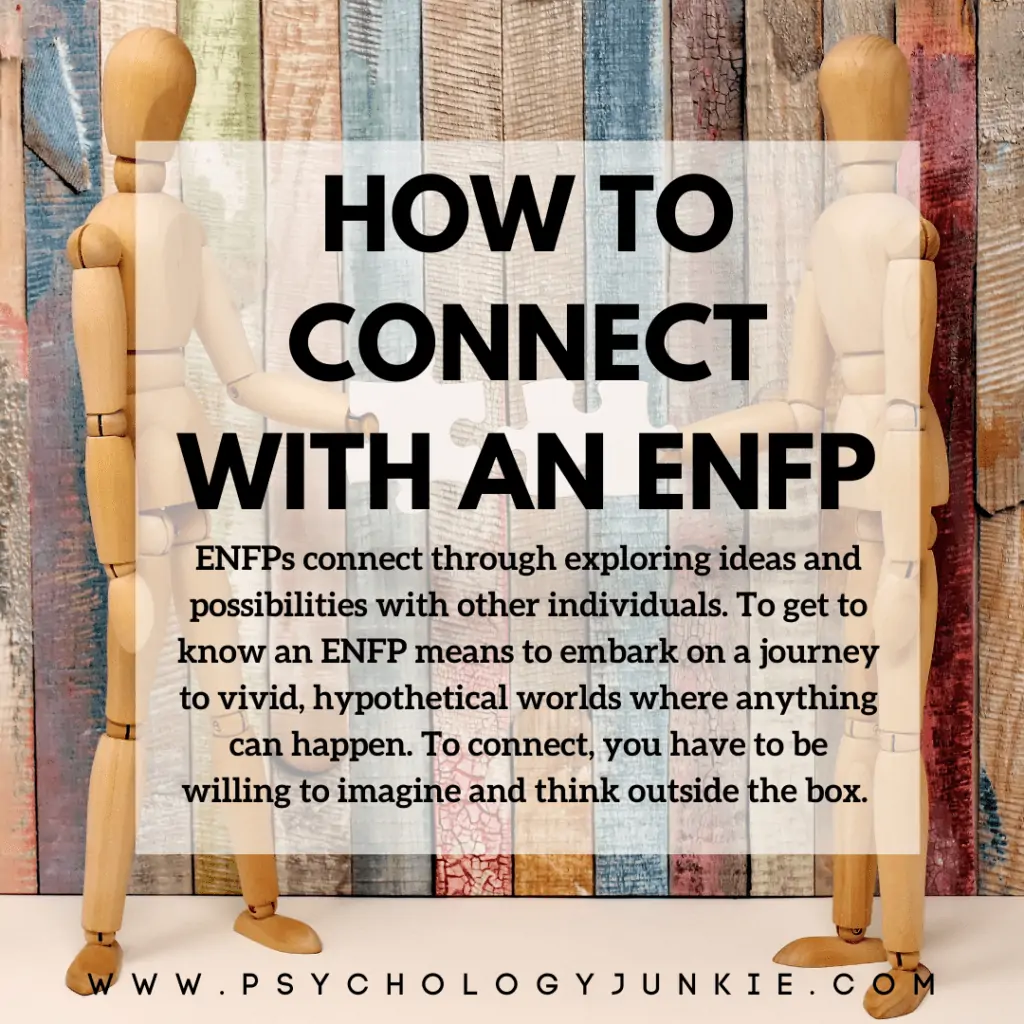How to Communicate Effectively with an ENFP
So you want to know how to talk to an ENFP that actually works? Maybe you’re dating an ENFP, the parent of an ENFP, or working alongside one! Knowing a few core qualities of this personality type can help you to have a better relationship with this type and to better see where they’re coming from!
What is an ENFP?
The ENFP is one of the 16 Myers-Briggs® personality types. Each of the four letters in their type code (ENFP) stands for something.

E = Extroversion. ENFPs focus first on the world around them to find ideas, possibilities, and energetic details.
N = iNtuition. ENFPs prefer focusing on abstract possibilities and ideas rather than tangible information. They prefer imagining what could be rather than dwelling on what “is.”
F = Feeling. ENFPs focus on their personal values when they make a decision. They want to live in alignment with their moral code and they consider the emotional impact a decision will have.
P = Perceiving. ENFPs like having a lot of options and tend to be adaptable and spontaneous. They like to mix work with play and enjoy an exploratory approach to life.
Not sure what your personality type is? Try out our most highly recommended personality questionnaires:
- You can take our free personality questionnaire here
- You can take Personality Hacker’s highly accurate personality questionnaire.
- You can take the official Myers-Briggs Type Indicator® for $49.95
This article contains an affiliate link to a questionnaire on Personality Hacker. If you purchase one of their courses, I get a small kickback that I can use to pay for hosting and other demands of this site. I only recommend courses I love.
The ENFP Identity:
ENFPs are from the Idealist temperament. Idealists (NF personality types) are interested in the process of becoming their true selves. They are on a search for self and a quest to find their purpose in life. David Keirsey, a psychologist who wrote Please Understand Me states that for the NF, the primary question in life is, “How can I become who I really am?” This question often propels them down paths of psychological, artistic, and spiritual discovery.
“(The NF) hungers for self-actualization, to be and to become real. To be what he is mean tto be and to have an identity which is uniquely his.” – David Keirsey
It’s crucial for the ENFP to have a sense of self that isn’t adopted by society for society’s sake. For the ENFP, to say “I like this” means that they have spent considerable time knowing that “this” (whatever it may be) is something that they like for no other reason than that it appeals to them or resonates with them deeply. They don’t want to be swayed by society’s pressures, peer pressure, or the need to conform.
The ENFP Communication Style:
Because of the very nature and motivation of the Idealist, ENFPs tend to use dramatic and abstract language. They have a love of metaphor, fantasy, symbolism, and empathy. Their words are often value-laden and they quickly pick up on the values of others.
The ENFP’s use of language is highly imaginative. They often have a knack for story-telling and can be very persuasive when they want to be. They are also very good at reading people and can quickly understand the motivations of those around them. This allows them to easily build rapport and connect with others on a deep level.
Signs you’re communicating with an ENFP:
- They bring up lots of possibilities and ideas
- Their energy is upbeat and curious
- They like to be involved and get others involved
- They’re less concerned with what’s “acceptable” and more concerned with what’s authentic
- They like exploring and presenting options
- They appear animated and expressive
- They have an engaging communication style and want to get you involved in the process of exploring ideas
What to Remember When Talking to an ENFP
The naturally free-spirited, empathetic nature of the ENFP can be compelling and magnetic. These types often draw others to them with their energy and accepting, authentic nature. But there are some things that will quickly turn them off. Harsh criticism, judgment, and closed-mindedness will quickly shut down an ENFP. They need to feel like they have the freedom to explore their ideas and be themselves without judgement.
Listen Without Making Assumptions:
Because ENFPs are very good at reading people, they can often see when someone is making assumptions about them. They’ll pick up on the cues that you’re not really listening to them and will quickly become frustrated. Instead, try to suspend judgment and just listen to what they have to say.
Don’t Try to Control the Conversation
ENFPs like to explore all the possibilities and options. Rather than seeking one absolute answer, they converse as an avenue to explore different ideas. Trying to control the conversation or steer it in a specific direction will only frustrate them. Give them room to brainstorm, extrapolate, or reimagine new alternatives.
Be Supportive:
Some people feel it’s their duty to be the anchor pulling the ENFP back “down to earth.” ENFPs love entertaining flights of imagination, but they also need someone who is supportive of their ideas and helps them to see the feasibility of putting their plans into action. This doesn’t mean they don’t appreciate constructive thoughts or critiques, but it does mean they don’t want to be constantly pulled away from their naturally possibility-seeking ways.
Be Authentic:
Self-realization for the ENFP means having integrity and authenticity. Many people shy away from this level of authenticity, fearing that they’ll be judged or that they won’t fit in. ENFPs will quickly see through this facade and will appreciate you more if you’re just yourself. It’s okay to share your vulnerabilities with them, as they will likely empathize with you and may even open up about their own insecurities.
Remember Their Core Values:
ENFPs have a strong set of core values that they live by. When people violate these values it can feel like a slap in the face to the ENFP. For example, if you’re spending time with a Republican ENFP and you start talking trash about Democrats, they may take it personally because one of their core values is tolerance. It’s important to remember that everyone has different values, and what might be a small thing to you could be a big deal to someone else.
Give Criticism Kindly:
Criticism that aims to put an ENFP in a place of shame or conformity will never go well or endear you to them. Instead, try to give criticism that is constructive and comes from a place of love or respect. They may not always agree with you, but they’ll at least appreciate your intention. You could try focusing on their strengths. For example, “You’re so good at motivating and energizing people. You get people comfortable in the group and help them feel involved!” and then launch into some modifications if necessary. Show that you recognize their individual strengths before offering objective criticism that might otherwise make them feel defensive or unappreciated.
Validate Their Feelings:
It’s natural that at times you’ll disagree with anyone, regardless of their type. When an ENFP comes to you with their feelings or frustrations, try to see things from their perspective. Even if you don’t agree with them, you can validate their feelings and show that you understand where they’re coming from. This will help to build trust and rapport between you and the ENFP.
Does this mean outwardly agreeing with them when you inwardly disagree?
No, it simply means that you’re validating the emotion behind their revelation. So, if an ENFP comes to you and says, “I’m really upset that my boss is constantly changing our deadlines,” you can validate their feelings by saying something like, “That sounds really frustrating. I can see how that would be difficult to deal with.” You don’t have to agree with everything they say, but you can still show empathy and understanding. This will go a long way with an ENFP. Just be sure to share your truth with an ENFP as well, especially if you’re in a relationship. They don’t want people to change who they are so that there are no conflicts or disagreements!
What Are Your Thoughts?
Are you an ENFP who has other suggestions for readers? Let us and other readers know in the comments! You might improve someone’s life with your ideas.
Discover more about your personality type in our eBooks, Discovering You: Unlocking the Power of Personality Type, The INFJ – Understanding the Mystic, The INTJ – Understanding the Strategist, and The INFP – Understanding the Dreamer. You can also connect with me via Facebook, Instagram, or Twitter!
Other Articles You Might Enjoy:
24 Signs That You’re an ENFP, The Visionary Personality Type
Dealing with Emotional Overwhelm as an ENFP
The Flirting Style of the ENFP Personality Type
Subscribe to Our Newsletter

Want to discover more about personality type? Get the inside scoop with Susan Storm on all things typological, along with special subscriber freebies, and discounts on new eBooks and courses! Join our newsletter today!












As an ENFP myself this article really resonated with me; how my best friend does most of these things and what I want other people to know about my way of communication.
thanks Susan
love yr work
Andy Hall JP
Western Australia
Thanks so much Andy!!
As an ENFP, I have a mother who does none of this and we are always fighting… it’s a very toxic relationship between us
I really enjoyed this article because I am an ENFP and I really wanted to figure out how I communicated. Honestly, this was really helpful! Thank you so, so much!
I’m an ENFP-A and this definitely rang true to me!! Thank you! I’ll be sharing this with other!
I’m a therapist and an ENFP. I use the MBTI to get a better picture of my clients. I’m 67 years old and usually can see who they are before giving them the exam.
One thing that somewhat troubled me in your article was the way you said to give an ENFP a compliment or affirmative statement before giving criticism. I draw back when folks do that with me. I would rather have trust in that person’s opinion or insight before I’ll be acknowledging of their critic. I realize this is somewhat narcissistic and defensive, however, I’ve found that folks who are equally receptive to receive criticism, are able enough to appeal to my sense of empathy and communicate that in a considerate honest and caring method. I’ve found that ISTJs are like a bull in a china shop when dealing with folks who are empathetic due to their disdain for dealing with feelings. Thus, I’ve found their criticism is jaded and often biased toward their understanding of a situation, and their communication is often uncaring and wrought with frustration when asked how they feel about something.
As an ENFP
I really find it relatable. Thanks for this as I know that I’m not the only one who things in that way. I appreciate your work thak you.
Thank you! I’m really glad that you found this helpful!
Totally agree!
We are fortunate that my husband and I are on completely opposite sides of the spectrum (I am ISTJ-A and he is ENFP-T), and while we couldn’t be more different, we are discovering that together we have a 360-degree view of every situation, and that is the incredible strength of our marriage!
Understanding yourself and then understanding your spouse is the key to building each other up rather than fighting each other’s qualities, and we are a living example of that.
I look at your blog often and want to thank you so much for the work you put into this very helpful material.